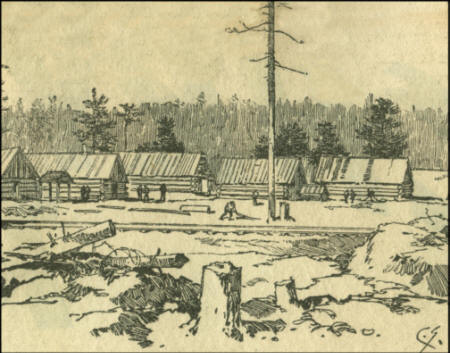Typical Logging Camp in 1887
Submitted by the Greenwood Public Library
 |
If your ancestor worked in a logging camp during the late 1880's in Clark Co., Wisconsin, the camp likely resembled the sketch above.
Logging Camps in Greenwood, Clark Co., WI
By an unknown author who lived in South Dakota
I think we may help ourselves a little by remembering that I am writing about activities as they were found on the upper Black River somewhere about 1845 or 1850. We will now quote a little from the words of the historian, but for the sake of condensation we shall omit words now and then.
Lumber camps sprang up like mushrooms and lumbering began in earnest in a region represented as "one immense forest."
These camps in general were about 20 by 40 feet, built of logs; some were six or seven logs high, and some were only two or three. These had high "scoop roofs" and gable ends, covered with shakes. This type of shanty was known as a "State of Maine" camp.
In one corner of the cook shanty was the cook and taffle's bunk, then there was a cook stove and a long table where the men ate, using long benches for seats. (Old Timer tells me the "taffle" was quite as likely to be called a "flunky" or "bull-cook", so now you know.)
The earliest camps did not have a cook stove, there being a big fireplace in the center of the shanty where the cooking was done.
While they had good food and plenty of it, there was no great variety, many dried apples, prunes and so forth being used, also blackstrap molasses in barrels, and no cook of today can make "ginger bread" which can quite equal that of early days. Often there was an abundance of game served.
The cook and taffle rose about two o'clock to get breakfast for the teamsters who hauled two loads of logs in the dark and one in the daylight.
There was generally a fiddle and accordion to be found in each camp. The men danced, played checkers on homemade boards, played games and tricks of all kinds, causing much merriment among themselves. No cards or liquor were allowed in the earliest camps. (I talked with Old Timer who tells me I must never forget the old poker game.) In the evening when everyone had made himself comfortable, the nightly session of story-telling from the honored deacon seat began. And so each night brought its own amusements, thereby helping to make the long winter evening seem sorter and more pleasant, in spite of the isolation. Magazines and papers were sent into the camps by different societies.
The timber cut at this period was all pine and would float, so it was hauled to the river, or creek, and piled mostly on the ice, where it was ready in the spring for the "drives" as soon as the river broke up. The driving was done by men who were supple, level-headed, and quick on their feet, not all of the men cared to do this work because of the danger of being drowned.
When the ice was out enough in the spring for the logs to float, the drive started, some men going ahead in a boat. The drivers wore heavy shoes laced to the knee, with calks in the soles and heels to keep them from slipping. They would go out on the floating logs and start down the river, using a peavie to keep the logs going straight. The full width of the river would be a mass of floating logs. Some of the men would stay on the logs when they went over; a rapids and shoot the rapids while other men would walk on the bank until the rapids were passed.
When the main drive was done sackers came, man wading in the ice-cold water, shoving logs out of sloughs, eddies, or wherever they were caught.
There is more to be told about this
early way of making a living but I think what you have read will suffice for
three purposes:
If any old timer is left he will be reminded of the things of which he was once a part.
New readers (yet fairly young and inexperienced) will have been reminded of the kind of life which required men of tough fiber.
All of us will reflect on an economic situation quite different from that which we now face--one which can never more return in America or in any other country of the globe, I fear. When we have a desire to sigh for the old times of prosperity, sound logic will always cause us to reflect on these things.
|
© Every submission is protected by the Digital Millennium Copyright Act of 1998.
Show your appreciation of this freely provided information by not copying it to any other site without our permission.
Become a Clark County History Buff
|
A site created and
maintained by the Clark County History Buffs
Webmasters: Leon Konieczny, Tanya Paschke, Janet & Stan Schwarze, James W. Sternitzky,
|
